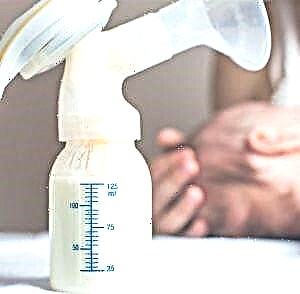Each baby needs special care and attention. Nutrition is an important aspect of life for the development and maintenance of an infant's body. After birth, breast milk is one of the main sources of energy replenishment of the baby's resources. When there is a lot of mother's milk and there is enough of it, the baby grows and develops at a normal pace, sleeps peacefully and gives the mother an opportunity to rest.
It happens that after childbirth there was enough milk, and then it suddenly began to disappear. Let's figure out together why this is happening and how to act in this difficult situation. What to do when there is little milk in the breast?
Lactation crisis
This phenomenon is due to physiological mechanisms and appears due to the fact that a child, making a leap in growth and development, needs a larger amount of food.
 The mother's body needs some more time to rebuild and increase the amount of milk.
The mother's body needs some more time to rebuild and increase the amount of milk.
- First crisis occurs at 3-4 weeks of a baby's life. This is a period of a sharp jump in the growth and development of internal organs.
- The second period of the crisis - 3 months. This is the age of active knowledge of the world around, when the child is already lying on his tummy, learning to actively roll over. It can either hang on the chest, or completely push it away.
- Third lactation crisis falls on 7 - 8 months. For many, breastfeeding stops at this stage. As a rule, the crisis lasts no more than three days. Lactation is getting better on its own.
Do not give up breastfeeding during this period. The milk will definitely arrive, just wait a few days.
Milk shortage indicators:
- Low weight gain.
- Reducing the number of wet diapers. There should be 11 - 13 of them per day.
- The baby's urine becomes concentrated, bright yellow with a pungent odor.
- Child's anxiety.
Reasons for a decrease in lactation:
- Stressful situations in the family.It happens that after giving birth, the baby behaves restlessly and the mother does not get enough sleep. Hence, constant nervousness, irritability and, as a result, quarrels in the family grow.
Of course, understanding relatives will always meet you halfway. But if this does not happen, try to remain calm, because not only the weather in the house, but also the well-being and behavior of the baby depends on the mood of the mother.
- Rare attachment to the breast.A newborn in the first month of life should eat every two hours. Moreover, there should not be long breaks at night.
- Psychological disposition, unwillingness to breastfeed. Many women, knowingly or not, do not want to breastfeed. This may be due to the fact that the mother does not want to spoil the figure, does not want to be constantly attached to the child.
Get all these thoughts out of your head. What nature gives you cannot be harmful.
- Refusal of the baby to feed.This may be due to a decreased sucking reflex or to a baby's illness.
- Reducing contact between mother and child during illness or during forced separation.
Methods for increasing lactation
Breastfeeding is a very important process in the life of a baby and a mother. But it so happened that the amount of milk was lost or significantly decreased. You can increase lactation in the following ways.
Proper organization of breastfeeding
To do this, you need to feed the baby on demand.
Do not add water or juices. Milk contains a sufficient amount of water, therefore, supplementing the baby is considered inappropriate. You can supplement during the hot season.
Try not to give your baby a pacifier, as it distracts from the sucking process and the baby may simply not want to breastfeed again.
Night feeds are very important. This is due to the physiological characteristics of the hormonal background. Prolactin is actively produced at night. It is a hormone that promotes milk production.
Expressing during the separation of mom and baby
Separation can happen due to illness of a mother or baby, or simply due to departure or other life situations.
 To avoid burning out the milk, you should express with a breast pump or with your hands every three hours during the day and several times at night.
To avoid burning out the milk, you should express with a breast pump or with your hands every three hours during the day and several times at night.
Do not worry. If done correctly, milk will not be wasted. When expressing, try to think of your baby.
Even after a week's separation, lactation can be restored.
During the restoration of normal lactation, the mixture should not be abruptly removed. Try to gradually reduce the volume of the formula, start feeding from the breast and finish it until the original amount of milk returns. If you feel that the child is eating, the mixture can be removed.
Rest and relaxation
Do not try to pull everything on your shoulders. If your baby is asleep, rest too. Connect your husband, relatives and friends to help you take care of your child. With inadequate rest, fatigue, milk can start to burn out, and we do not need this at all.
Physical methods to help a nursing mother
Here you can use a warm shower or bath, massage of the neck-collar zone, back, massage of the mammary glands.
Warm showers increase milk production and facilitate milk flow.
A proper breast massage will also help to increase the amount of breast milk. Gentle stroking movements from the base of the breast to the nipple will facilitate milk flow. You can massage using baby oil.
Constant contact with the baby
During the establishment of lactation, mother and baby must "stick to each other." This is necessary so that the baby can smell mother's milk, which stimulates the sucking reflex.
Nutrition
The diet of a nursing woman must include a variety of foods - hot soups, meat, dairy products, cereals, fruits, vegetables. It is very important to observe the water regime - to drink up to 1.5 liters of water per day.

Milk-boosting foods:
- cheeses;
- kefir, yogurt;
- cottage cheese;
- spices and spices;
- oils;
- carrot juice;
- walnuts;
- meat.
Certain medications can spoil the taste of milk. For this reason, the baby may refuse to feed.
If you see that the baby is reluctant to suckle, then taste your own milk. It should be sweet, without bitterness.
Herbal teas to help mom
It has been known since ancient times that some herbs increase lactation levels:
- Nettle. Enhances milk production, improves blood supply to the mammary gland.
- Fennel. Stimulates lactation, reduces gas formation.
- Pharmacy chamomile, hops. They have a sedative, calming effect.
- Fenugreek. A powerful milk booster. Sometimes used to stimulate lactation in foster mothers.
- Thistle. It has a beneficial effect on the functions of the digestive tract.
These herbs can be used as infusions. To do this, the grass must be poured with boiling water and insisted. Take half a cup 3 times a day until breast milk is restored.

The pharmacies sell ready-made lactogenic teas in filter bags from Hipp, Evalar, and Babushkino Lukoshko.
Maria, 28 years old: “In the second month of breastfeeding, I began to realize that my baby was not getting enough milk. I really wanted to breastfeed, because the mixtures are very expensive, and they cannot be compared with mother's milk. In the pharmacy I bought tea from the Evalar Bio company. On the third day of admission I felt a rush, and the milk returned in the same volume. "
Lactation cannot recover in one day. This can take about a month. You need to be patient.
How to increase lactation, choose, of course, a nursing mother. It should not be forgotten that correct lactation is “in the head”. Under comfortable conditions and a great desire, milk can be returned and stored for a long time. Don't panic. With the right mood, you can safely increase the amount of breast milk and continue feeding.



